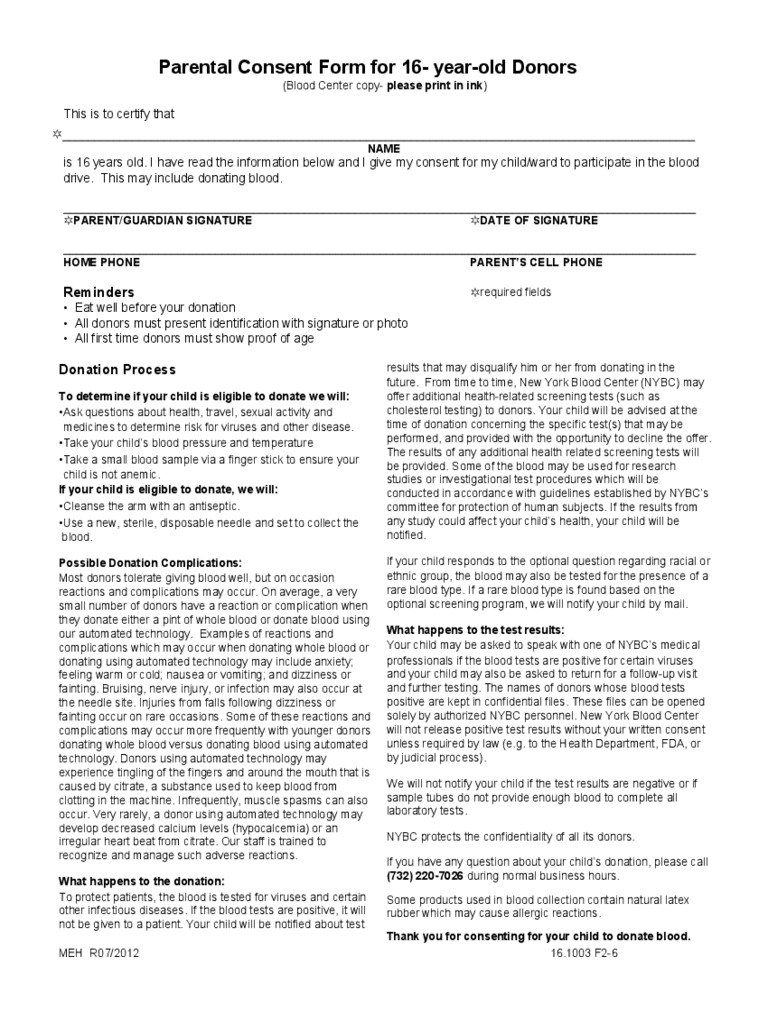Fillable Printable Parent Consent Form for 16-year- old Donors - New Jersey
Fillable Printable Parent Consent Form for 16-year- old Donors - New Jersey

Parent Consent Form for 16-year- old Donors - New Jersey

Parental Consent Form for 16- year-old Donors
(Blood Center copy- please print in ink)
This is to certify that
____________________________________________________________________________________________________
NAME
is 16 years old. I have read the information below and I give my consent for my child/ward to participate in the blood
drive. This may include donating blood.
____________________________________________________________________________________________________
PARENT/GUARDIAN SIGNATURE
DATE OF SIGNATURE
____________________________________________________________________________________________________
HOME PHONE PARENT’S CELL PHONE
Reminders
required fields
• Eat well before your donation
• All donors must present identification with signature or photo
• All first time donors must show proof of age
Donation Process
To determine if your child is eligible to donate we will:
•
Ask questions about health, travel, sexual activity and
medicines to determine risk for viruses and other disease.
•
Take your child’s blood pressure and temperature
•
Take a small blood sample via a finger stick to ensure your
child is not anemic.
If your child is eligible to donate, we will:
•
Cleanse the arm with an antiseptic.
•
Use a new, sterile, disposable needle and set to collect the
blood.
Possible Donation Complications:
Most donors tolerate giving blood well, but on occasion
reactions and complications may occur. On average, a very
small number of donors have a reaction or complication when
they donate either a pint of whole blood or donate blood using
our automated technology. Examples of reactions and
complications which may occur when donating whole blood or
donating using automated technology may include anxiety;
feeling warm or cold; nausea or vomiting; and dizziness or
fainting. Bruising, nerve injury, or infection may also occur at
the needle site. Injuries from falls following dizziness or
fainting occur on rare occasions. Some of these reactions and
complications may occur more frequently with younger donors
donating whole blood versus donating blood using automated
technology. Donors using automated technology may
experience tingling of the fingers and around the mouth that is
caused by citrate, a substance used to keep blood from
clotting in the machine. Infrequently, muscle spasms can also
occur. Very rarely, a donor using automated technology may
develop decreased calcium levels (hypocalcemia) or an
irregular heart beat from citrate. Our staff is trained to
recognize and manage such adverse reactions.
What happens to the donation:
To protect patients, the blood is tested for viruses and certain
other infectious diseases. If the blood tests are positive, it will
not be given to a patient. Your child will be notified about test
results that may disqualify him or her from donating in the
future. From time to time, New York Blood Center (NYBC) may
offer additional health-related screening tests (such as
cholesterol testing) to donors. Your child will be advised at the
time of donation concerning the specific test(s) that may be
performed, and provided with the opportunity to decline the offer.
The results of any additional health related screening tests will
be provided. Some of the blood may be used for research
studies or investigational test procedures which will be
conducted in accordance with guidelines established by NYBC’s
committee for protection of human subjects. If the results from
any study could affect your child’s health, your child will be
notified.
If your child responds to the optional question regarding racial or
ethnic group, the blood may also be tested for the presence of a
rare blood type. If a rare blood type is found based on the
optional screening program, we will notify your child by mail.
What happens to the test results:
Your child may be asked to speak with one of NYBC’s medical
professionals if the blood tests are positive for certain viruses
and your child may also be asked to return for a follow-up visit
and further testing. The names of donors whose blood tests
positive are kept in confidential files. These files can be opened
solely by authorized NYBC personnel. New York Blood Center
will not release positive test results without your written consent
unless required by law (e.g. to the Health Department, FDA, or
by judicial process).
We will not notify your child if the test results are negative or if
sample tubes do not provide enough blood to complete all
laboratory tests.
NYBC protects the confidentiality of all its donors.
If you have any question about your child’s donation, please call
(732) 220-7026 during normal business hours.
Some products used in blood collection contain natural latex
rubber which may cause allergic reactions.
Thank you for consenting for your child to donate blood.
MEH R07/2012
16.1003 F2-6



